The late sixties were an eventful period to say the least. Peace rallies opposing the continued American military presence in Vietnam were growing like wildfire, the Beatles maintained their dominance of the music charts with the release of their “Sgt. Peppers Lonely Heart Club Band” album, and the summer months were dubbed the “summer of love” for more reasons than one.
In the world of sports, the NFL’s first-ever Super Bowl saw Vince Lombardi’s Green Bay Packers handily defeat Hank Stram’s Kansas City Chiefs, while charismatic boxer Muhammad Ali was unjustly stripped of his World Heavyweight Champion titles for his refusal to serve his country in the aforementioned war in Vietnam.
On the ice, the Toronto Maple Leafs outlasted the Montreal Canadiens in six games to take home the franchise’s 13th Stanley Cup. Much to the chagrin of Leafs fans, they are still waiting for No. 14 to be paraded up and down Yonge Street. Elsewhere in the NHL, the league doubled in size by welcoming six new teams in time for the 1967-68 season: the California/Oakland Seals, Minnesota North Stars, St. Louis Blues, Philadelphia Flyers, Pittsburgh Penguins and, last but not least, your beloved Los Angeles Kings. The name that owner Jack Kent Cooke decided on to give the team a royal feel.
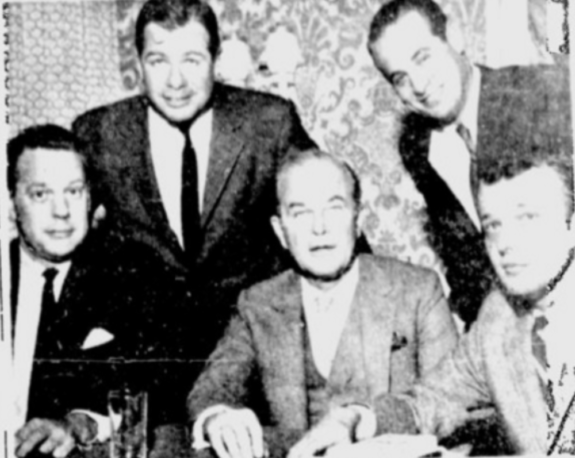
Now, what better way to lament on the Kings’ recent disappointing playoff exit at the hands of the expansion Vegas Golden Knights than to pay homage to the Kings’ enigmatic expansion team of the late sixties?
California Dreamin’
Cooke certainly was a dreamer. Originally from Hamilton, Ontario, the businessman had enjoyed success in the electronic and print media industry, but had his sights firmly set on his ultimate passion – owning a sports franchise. He started off by acquiring the Toronto Maple Leafs minor league baseball club in 1951, followed by the Washington Redskins of the NFL in 1961, and the Los Angeles Lakers of the NBA in 1965. Heck, he even founded the Los Angeles Wolves of the United Soccer Association in 1967. His next target was bringing NHL hockey to Southern California.
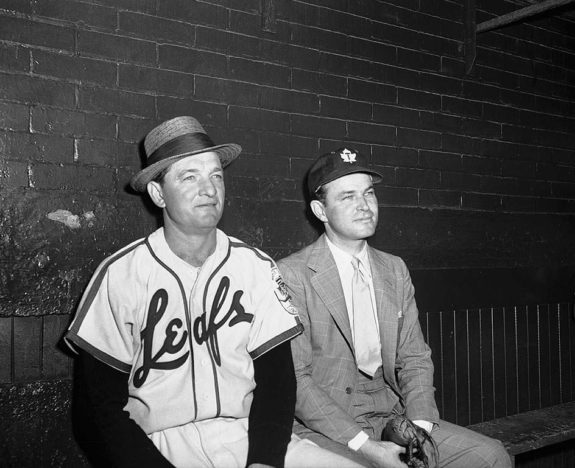
It was in 1965 that NHL commissioner Clarence Campbell announced that the league was moving forward with expansion plans and had earmarked specific cities, one of which was Los Angeles, to fill these pending vacancies. Upon hearing this news, Cooke zealously prepared a bid which would involve a $2 million expansion fee and the procurement of a hockey-ready arena. Seemed straightforward for someone as successful and well connected as Cooke.
The problem was that Los Angeles Rams owner Dan Reeves was spearheading a competing bid for the franchise as part of the Los Angeles Memorial Coliseum Commission. If Cooke was fortunate enough to win the bid, he would be restricted from leveraging the competitor’s sporting facility full-time and, as a result, would have to erect his own.
Challenge accepted.
Cooke’s bid prevailed with the arrangement of playing the first few months of team’s inaugural season at the Long Beach Arena as well as the Los Angeles Memorial Sports Arena before taking up permanent residence in their fabulous new home.
“The Fabulous Forum”
Located in southwestern Los Angeles County, Inglewood was selected as the city for Cooke’s expansion team to call home for the foreseeable future. Designed by renowned architect Charles Luckman, who also designed Madison Square Garden, the arena was meant to replicate the prestige of the Roman Coliseum in Rome, Italy. With that vision in mind, Cooke eloquently referred to the arena as “The Fabulous Forum”, or simply “The Forum” to the rest of us.
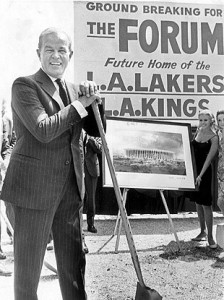
With a non-negotiable deadline from the NHL of having a new arena up and running by Dec. 31, 1967, Cooke promised Luckman and his design team to be hands-off to help expedite things. Construction of the arena would go around the clock in order reach the aggressive timelines. The team flexed their creative muscle by having sixty-foot tall Romanesque arches being developed on-site, as they were far too large to transport, as well as using helicopters to place building mechanical on the rooftop.
The extreme diligence and imagination of the crew paid off as the arena opened its doors on New Year’s Eve – i.e. right on time. A fabulous arena required an equally fabulous ribbon-cutting ceremony, which is what Cooke delivered.
His hockey team would now be ready to move to their royal abode. The question remained, what would this team look like?
The Royal Brain Trust
Although Cooke was adept at owning professional sports teams, he certainly knew his limits. With that in mind, he called upon familiarity and hockey pedigree to help run the show in “La La Land”.
A Jack of all Trades
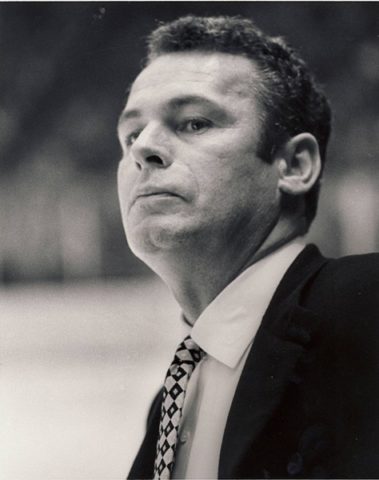
Larry Regan played a respectable six seasons in the NHL, split between the Boston Bruins and Maple Leafs. As his playing career had plateaued and was now trending downwards, he decided to take on the role of player/head coach for the Pittsburgh Hornets of the AHL for part of the 1961-62 season. After a couple of years of playing abroad and finalizing his playing career with the Baltimore Clippers of the AHL, Regan decided to shift his full attention to the managerial side of things. After a brief stint as the bench boss of the Etobicoke Indians of the Ontario Hockey Association, Regan got the opportunity of a lifetime from an old friend.
Regan was initially offered the head scout role with the expansion Kings, but was ultimately named the club’s first ever general manager on June 8, 1967. It certainly did not hurt that Regan and the team’s owner had already established a good rapport with one another.
“I knew Jack from the years I played in Toronto. We became pretty good friends along the way and stayed in touch,” Regan said. “Then I heard about the NHL expanding, I put my oar in the water with Jack before anybody else and I was fortunate enough to be chosen.”
Seeing Red
Leonard Patrick “Red” Kelly was living the dream. He was fresh off of winning his eighth Stanley Cup as a player, and fourth in eight years with the Maple Leafs. After an esteemed 19-year NHL playing career, the future Hall-of-Famer decided that it was time to hang up in the skates in favor of a suit and a pair of loafers. However, his ability to transition into coaching wasn’t without its roadblocks.
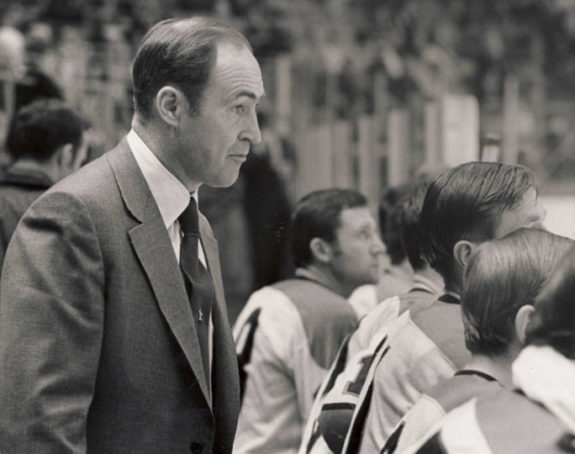
Upon announcing his retirement as a player and negotiating a deal with Kings brass to become their first-ever coach, Maple Leafs head coach Punch Imlach insisted that the Kings draft Kelly as a player in the upcoming expansion draft. Doing so would help the Leafs protect other notable players from being plucked away. A pretty cagey, yet audacious request, right? Well, the Kings did not fully budge. Instead, the two sides eventually agreed on the Kings shipping out minor-league defenceman Ken Block to Toronto.
Newly Elected Kings
Following the 1966 NHL season, the existing “original six” teams were allowed to protect 11 skaters and one goalie for the upcoming expansion draft. Each of the six expansion teams would then be able to pick and choose from the eligible list until each team had selected 20 players in total. The Kings were fortuitously blessed with the (first) pick of the litter and got their hands on a future NHL Hall-of-Fame netminder in the twilight of his career.
“The Uke”
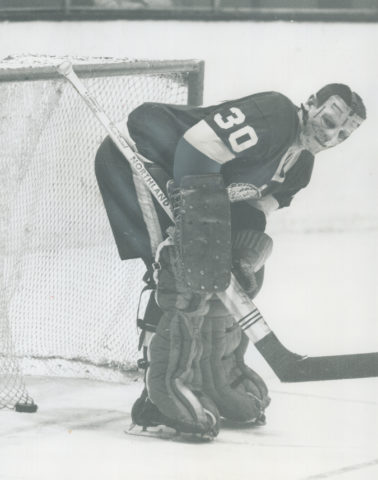
With the Kings already securing the services of an ex-Maple Leaf player as their coach, why not double down and select legendary goalie Terry Sawchuk as the team’s first-ever player? Nicknamed “Ukey” or “The Uke” by his teammates because of his Ukrainian heritage, Sawchuk had played an astounding 18 seasons in the NHL prior to joining the Kings. Although he played multiple seasons with the Bruins and Maple Leafs, he is best known for being a staple in between the pipes for the powerful Detroit Red Wings teams of the early-1950s to mid-1960s.
Sawchuk was best known for his time with the Detroit Red Wings. His resumé is stupendous, to say the least:
- Four-time Stanley Cup winner (’52, ’54, ’55, ’67)
- Four-time Vezina Trophy winner (’52, ’53, ’55, ’65)
- Calder Memorial Trophy winner (’51)
- Three-time NHL First-Team All-Star (’51, ’52, ’53)
- First ever goalie to record 100 career shutouts
- Included in 100 Greatest NHL Players list
Despite being the tender age of 37 when he was selected by the Kings, the Uke still had some gas left in the tank. His playing time had recently diminished while splitting duties with fellow Hall-of-Fame goalie Johnny Bower in Toronto. He would soon share a similar fate in Los Angeles.
The “Other” Goalie
Wayne Rutledge was an unheralded goalie that was looking for his big break in the NHL at the age of 26. Although his rights were owned by the New York Rangers, Rutledge had yet to see any big league action leading into the 1967-68 season. He had honed his craft in the CPHL the preceding three seasons and the Rangers decided to leave him exposed for the expansion draft. General manager Regan must have seen something he liked, as he decided to select the enigmatic goaltender with the Kings’ second-round pick. It was becoming quite clear that the Kings wanted to have a robust last line of defense, in hopes of fielding a competitive team.
Nicknames O’Plenty
The remainder of the team’s expansion draft was laden with solid, yet unspectacular players. This included the likes of Canadiens center Gord Labossiere, Red Wings defenseman Bob Wall, and Bruins left winger Ted Irvine. The team also managed to secure the services of promising young defender Bill White to help further solidify their back-end.
Although this group of newly elected Kings were far from pushovers, they certainly did not have the star power that the city of Los Angeles was accustomed to. With that in mind, Cooke and the Kings upper management put their marketing hats on and decided to ordain specific players catchy nicknames to help increase the team’s cachet. Los Angeles was now the new home of Eddie “The Jet” Joyal, Bill “Cowboy” Flett, and Real “Frenchy” Lemieux, among others.
Ladies and gentlemen, your 1967-68 Los Angeles Kings were now ready to hit the ice:
A Killer of a Start
The team’s first ever regular season game was played on Oct. 14, 1967, at the modest Long Beach Arena. With the ability to hold 13,500 fans, the team’s inaugural match against their expansion cousins, the Philadelphia Flyers, was only able to render an attendance of just over 7,000. The Kings were undeterred by the underwhelming welcome and proceeded to take down the Flyers to the tune of a 4-2 victory.
Undoubtedly, the player of the game was pesky center Brian Kilrea. Affectionately referred to as “Killer” because of his surname, the journeyman notched two goals and an assist on the evening. Most importantly, his first goal also marked the first in Kings history. Kilrea recently celebrated the anniversary of this historic milestone:
The Original California Hockey Rivalry
Yes, the present day Kings have a heated rivalry with interstate and inter-divisional rivals in the Anaheim Ducks and San Jose Sharks. However, the real on-ice battle of California technically commenced in 1967.
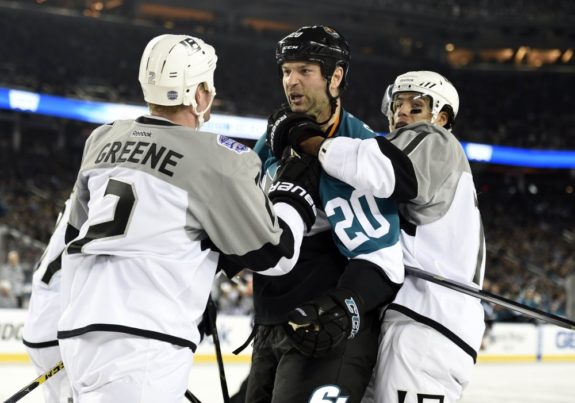
The Kings were placed in the newly formed West Division of the NHL with the other five expansion teams, which included the California/Oakland Seals. Much to the delight of Kings fans, the Seals were the inferior of the two sides, yet put up a good fight during their encounters. In nine regular season games, each side came away with four wins and a tie. Unfortunately for Seals fans, their season overall was of the disastrous variety. The team finished with a league-low 15 wins and 47 points in 74 overall games. Conversely, their neighbors to the south enjoyed much more success that season.
A Successful Freshman Campaign
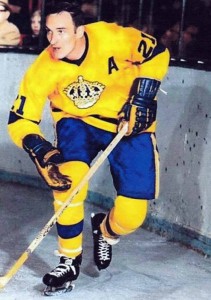
Led in scoring by “The Jet” (Joyal) and “The Cowboy” (Flett), the commanding back-end presence of defenders White and Wall, as well as solid goaltending from the duo of Sawchuk and Rutledge, the Kings enjoyed a successful freshman campaign. The team ended the regular season with a 31-33-10 record, which was enough to secure the second seed in the Western Division, and a playoff birth.
The team was brimming with confidence in advance of their quarterfinal playoff match-up against the North Stars. The Kings got their postseason off to an ideal start by defeating the Stars in the first two games in Los Angeles, with Joyal notching a goal in both games. Games 3 through 6 were won by the home team, which resulted in a deciding Game 7 back in California. Suffice it to say, home ice was not much of an advantage on this occasion, as Minnesota throttled the Kings, 9-4.
Laying the Foundation of Royalty
Regardless of the how lopsided the Kings’ finale was, the narrative of how this expansion team came to be and the success the team managed to achieve that season is both compelling and inspiring at the same time. Sure, they were not the Cinderella story that the Golden Knights have become this year. That said, they laid down a foundation that future Kings teams have continued to build upon, which has resulted in consistent success and an incredibly passionate fan base.
A tip of the cap to the 1967-68 Los Angeles Kings is rightfully in order.